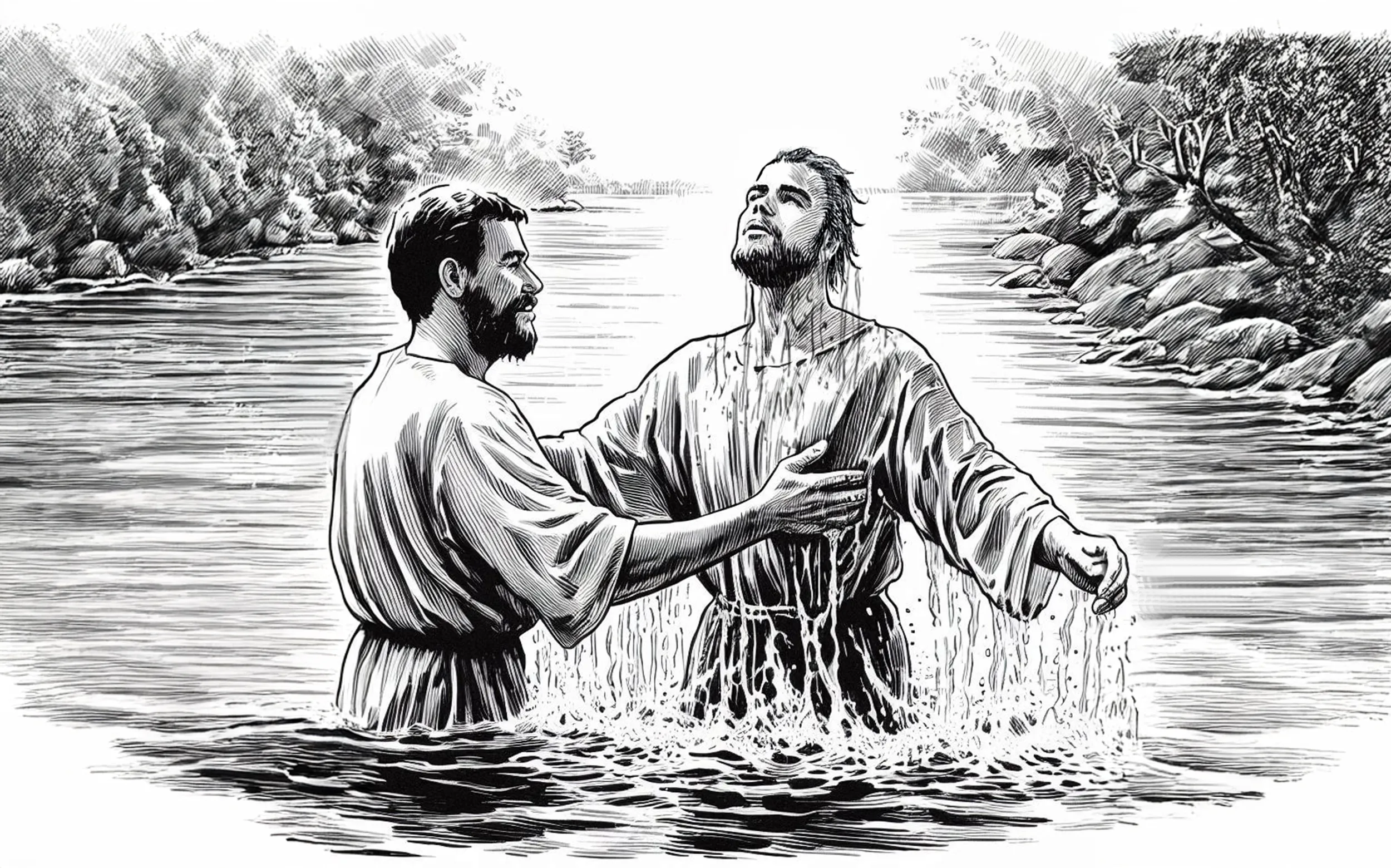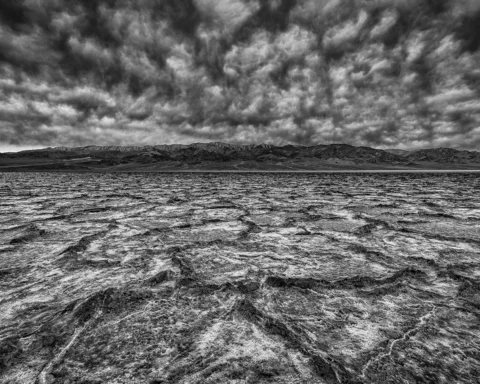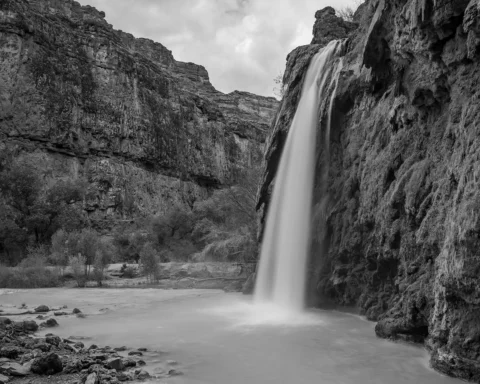ILLUSTRATION BY FIKI. © 2025 ISI.BIBLE
He who has believed and has been baptized shall be saved. – Mark 16:16
El que crea y sea bautizado será salvo. – Marcos 16:16
Since baptism is dismissed by many as not being required for salvation, I want to address some of the reasons I have heard given to support that position, along with my rebuttal:
- Baptism is a “good work of man”: This comes from the “saved by faith alone” crowd. First, this shows a complete misunderstanding of what a “good work” is. A good work is something that is done, after conversion and in obedience to the teachings and commandments of Christ, that benefits someone else, not yourself.[1] Second, how can having someone else immerse you in water be considered a “good work” on your part at all? It is not even you who is doing the work of dunking! Third, and most importantly, it is Christ who is actually doing all the work at your baptism, not you (cf. Php 2:13). It is He who is forgiving your sins, not you! He is the one who is redeeming you and cleansing you of sin by His shed blood on the cross. So, give glory to Jesus and let Him do His work in you at baptism.[2]
- The second half of Mark 16:16 doesn’t mention baptism: This claim asserts that since the first half of Mark 16:16 mentions baptism but the second half doesn’t; therefore, baptism is not required for salvation. In response, I say, please use some simple logic and common sense here: there is no need to mention baptism (or repentance, confession, obedience, perseverance, etc.) in the second part of the verse because without faith one is condemned regardless of whether one is dunked in water or not, so it would be completely redundant to mention baptism in this part of the verse—it is simply not needed. Wayne Jackson writes:[3] “After introducing the person who ‘believes not,’ why in the name of common sense would it be necessary for the Lord to list additional items of rebellion, in order to emphasize the unbeliever’s state of condemnation? Besides, elsewhere in the divine record Jesus did warn of the consequences of rejecting baptism. Such rejection, according to Luke’s record, is the reflection of an attitude that repudiates the very ‘counsel of God’ (see 7:29–30).” Furthermore, if one adopts their (wrong) logic, one must also say that since the first part of Mark 16:16 doesn’t mention repentance, that repentance, therefore, isn’t required for salvation either! I think, and hope, no clear-thinking Christian would adopt such a position. As you can see, those who make this argument are using different (and inconsistent) rules of logic for the two parts of Mark 16:16. When you point this out to those who deny baptism on this basis, they just don’t seem to be able to see their error in logic and resulting inconsistency.[4] Even beyond the simple logic error, one must consider “the sum” of what Scripture teaches on any particular subject in order to arrive at truth and correct doctrine (Psa 119:160). It is true that various verses call out and stress certain elements of salvation at times for various reasons (some repentance, some faith/belief, some confession, and so on), but you cannot create a Gospel doctrine that agrees with some verses and contradicts with others—your doctrine must harmonize true across all of Scripture, for Scripture is 100% correct and never contradicts itself. No matter what you think or believe, if it contracts even so much as one single clear and unambiguous verse of Scripture, it is not Scripture that is wrong; it is your interpretation that is wrong. This is one of the most common causes of doctrinal errors.
- The Cornelius conversion (Acts 10:1–23): The claim made here is that since Cornelius et al. received the Holy Spirit before they were baptized, then this also applies to all believers today, and therefore baptism isn’t required for salvation (or to receive the Holy Spirit). What this fails to recognize is that the Cornelius conversion was a special case—it signified the expansion of the Gospel message to the gentiles. In this instance, the Spirit was specifically given here as a sign, so Peter knew that salvation is also for the gentiles. Without such a sign, Peter (et al.) would not have started preaching the Gospel to the gentiles. So yes, this event was a special and unique confirmation by the Spirit and recorded for us in Scripture.
- Paul did not go to baptize, therefore baptism isn’t required: This is a generalization from 1 Corinthians 1:14–16 that isn’t warranted in Scripture or supported by logic. The context of those verses is concerning a problem that some in Corinth were being puffed up (pride) because they were baptized by the great apostle Paul and hence felt superior to others—they were unduly identifying with Paul instead of with the Gospel as a whole and with Christ. What Paul is trying to get across here is that it is the Gospel message itself that is important (including baptism!), not the particular person who happens to immerse you in the water! Nothing about this section of Scripture contradicts or denies the very clear and unambiguous teachings on baptism given elsewhere. Even further, let’s press this false interpretation to the ultimate pinnacle: In exactly similar fashion in John 4:1–2, it is noted that Jesus Himself didn’t personally baptize anyone (His disciples did), so by way of analogy, one would have to conclude that by John 4:1–2 baptism isn’t necessary either, despite Jesus clear teaching to the contrary! Once again, it is the pride of man which is in focus here, not whether baptism is required. Please think about this using yourself as a test case: Imagine if Jesus personally baptized you; do you not see how tremendous pride could result from that and you might feel superior to others, even other brothers and sisters in Christ? I do! That is the point being made here in both passages of Scripture. These verses have nothing whatsoever to do with the removal of baptism as a required element for salvation. Paul, and Jesus, simply wanted to avoid pride which might result from an association with who (or Who) did the baptismal immersion…that is all.
- The deserted island (or middle of a desert) straw-man argument: Some make the argument: Since a person stranded on a deserted island (or in the middle of a desert without water) who comes to Christ can’t be baptized; therefore, baptism is not required for salvation (by anyone). This argument doesn’t really need a response, as it’s completely ridiculous, spurious, and does absolutely nothing to defend their teaching. However, if you find yourself in one of those locations and accept Christ there, rest assured that Christ will find a way to allow you to be saved properly according to Scripture. Franky, I’m surprised they don’t also argue: What if you are on the moon and accept Christ? as a proof case against baptism. Instead of worrying about a hypothetical fictional case that applies to literally no one, the focus should be on the clear Scriptures that do apply to you!
- The thief on the cross wasn’t baptized, so it’s not required: First of all, the thief on the cross actually died under OT Mosaic Law; the New Covenant (NT) didn’t take effect until Christ’s death, so Christian baptism wasn’t required for him. Furthermore, he may have been baptized in John’s baptism; we do not know. Scripture doesn’t say whether he was or wasn’t. The thief seems to be familiar with Christ and His teachings, at least to some extent. But let’s assume for argument’s sake that he wasn’t. Christ, who is God Almighty Himself, can do whatever He pleases, whenever He pleases! He can make any special exceptions He deems necessary or pleasing to His will—who are we to say otherwise? While on earth, Jesus repeatedly forgave the sins of various people, like the thief. But to make a general case of this wonderful special conversion and demonstration of grace is a travesty of logic and flies in the face of other clear and unambiguous verses about baptism given in Scripture for NT Christians. And let’s press this argument to its logical conclusion—I’m willing to concede that if (a) you find yourself hanging on a cross, and (b) you are hanging right next to Christ, then yes, (c) you too may be saved simply by Christ’s proclamation over you without baptism. But that simply doesn’t apply to any of us today, now does it? So why use this case to deny baptism in the face of clear Scripture to the contrary?
- Salvation is a free gift of God; therefore, nothing is required of me to receive it: However, a “free gift” can have conditions placed on it in order receive it, and God has done just that. This is not unlike a parent saying something to the effect of: When you graduate from college, I’ll buy you a car. The child must graduate in order to receive the gift. If the child does nothing, they will not receive the gift.
- I just don’t believe it is required: This statement usually comes from those who knowingly (or unknowingly[5]) think they are saved by “faith alone.” I have explained throughout this book why this position is not in agreement with Scripture.[6]
- It’s what we’ve been teaching for a long time, so it must be correct: Yes, I have actually run across this claim, which goes something like this (paraphrasing): Well, we have been teaching that baptism is not required for many hundreds of years, so we must be right! Yes, some actually think that adds credibility to their position, but the fact that they have been teaching something (wrongly) for any period of time does absolutely nothing whatsoever to bolster their defense that the teaching is correct. If one adopts their own logic here, then they must also concede that the Roman Catholic Church could therefore come along right after them and say: Well, since we have been teaching (falsely) on matters of doctrine for nearly two thousand years, our teachings must be even more correct! I hope you can see the absurdity of this argument.
I hope you can see that all of these arguments about dismissing baptism as being required for salvation are without merit.
And as a final warning, I again remind you that many false teachings and “fake gospels” (paraphrase; see 2Co 11:3–5; Gal 1:8–9; Mat 24:5) have gone out into the world. You must “worship the Lord in spirit and truth” (see Joh 4:23–24) and also “contend earnestly for the faith which was once for all handed down to the saints” (Jud 3) in NT Scripture.[7]
Amen.
[1] See the chapter “The Role of Works” for more information.
[2] See the chapter “What Happens at Baptism” for more information.
[3] Jackson, Wayne. “The Assault upon Mark 16:16.” ChristianCourier.com. https://christiancourier.com/articles/the-assault-upon-mark-16-16
[4] I’d like to give a non-threatening analogy that parents can relate to. If you tell little Johnny that he can have an ice cream cone after he finishes dinner and does his homework, when can little Johnny have the ice cream? Is it after he finishes dinner? Or is it after he finishes dinner and also does his homework? Correct: It is only after both finishing dinner and doing his homework. Thus, when Scripture says that “He who has believed and has been baptized shall be saved” (emphasis mine), when is a person saved (i.e., born again with their sins forgiven)? Is it before or after baptism? Correct again: It is after (at) baptism! Why such simple logic that even a second grader can understand evades most teachers and preachers of the Word (even those with doctrinal degrees in divinity!) is mind-boggling. The very same language and logic are easily understood when applied to a harmless topic such as little Johnny and ice cream.
[5] For example, the “Hippie gospel,” where a person “Just feels Jesus in their heart” but never actually reads and studies the Bible, attends church, or does anything commanded by Christ.
[6] See our book The Gospel of the Grace of God.
[7] See that chapter “Beware the Wolves” in our book The Gospel of the Grace of God for more information.






